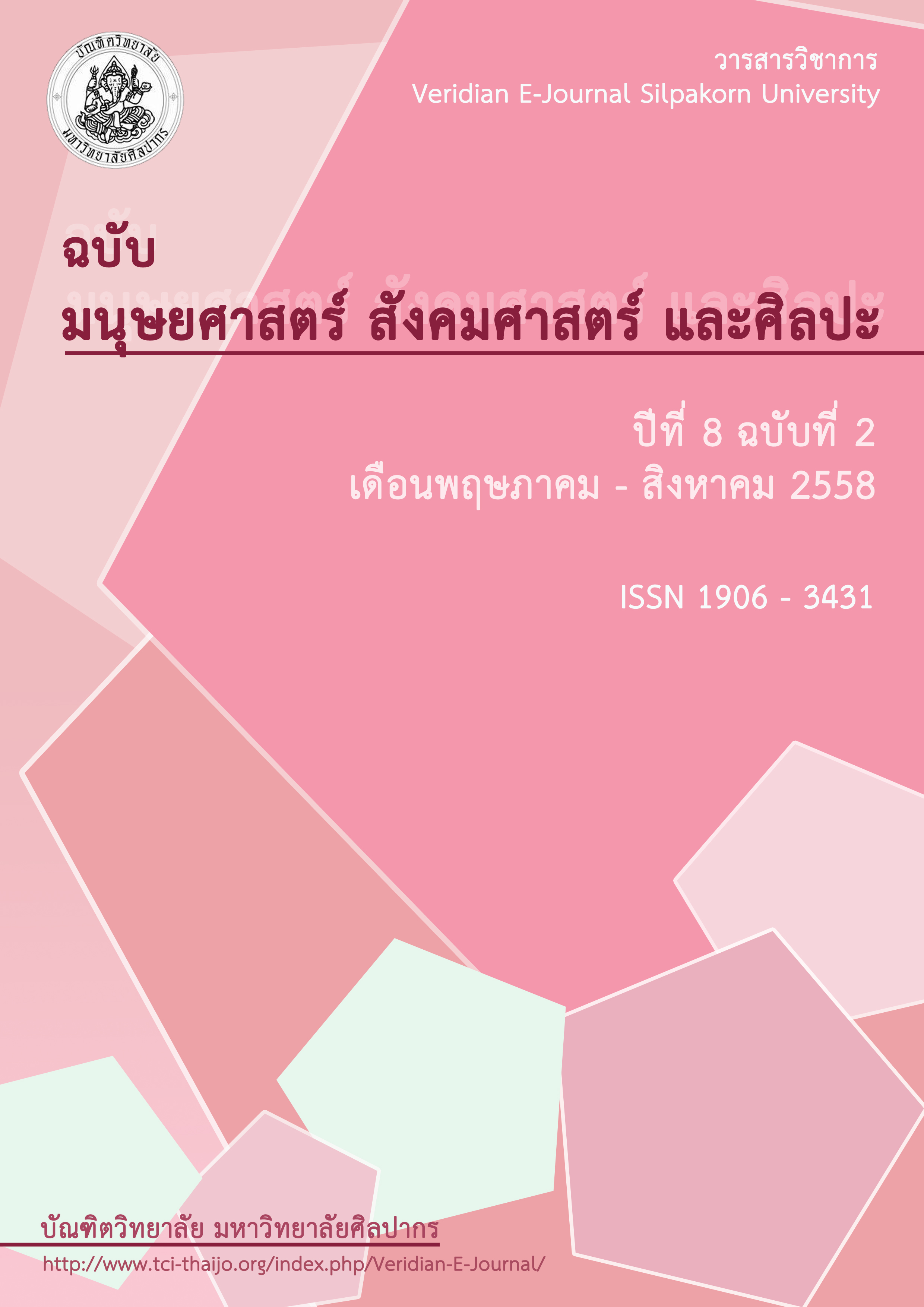ทุนของสังคมในกระบวนการยุติธรรมเชิงสมานฉันท์:กรณีศึกษาศูนย์ยุติธรรมชุมชนพนมสารคาม
Main Article Content
Abstract
บทคัดย่อ
การศึกษาเรื่องนี้มีวัตถุประสงค์ เพื่อศึกษาประเภทของทุนของสังคมในกระบวนการยุติธรรมเชิงสมานฉันท์ และศึกษาการใช้ทุนของสังคมในกระบวนการยุติธรรมเชิงสมานฉันท์ ตลอดจนพิจารณาถึงปัญหาและอุปสรรคในกระบวนการยุติธรรมเชิงสมานฉันท์และแนวทางในการเสริมสร้างความเข้มแข็งให้กับทุนของสังคมเพื่อเป็นกลไกในการแก้ไขข้อพิพาทตามกระบวนการยุติธรรมเชิงสมานฉันท์ วิธีการศึกษาใช้แนวทางการวิจัยเชิงคุณภาพ โดยเก็บรวบรวมข้อมูล จากเจ้าหน้าที่ศูนย์ยุติธรรมชุมชน เครือข่ายศูนย์ยุติธรรมชุมชน เจ้าหน้าที่ตำรวจ และ ผู้ที่มาขอความช่วยเหลือการไกล่เกลี่ย รวมทั้งสิ้น 24 คน
ผลการศึกษา พบว่า การใช้ทุนของสังคมในกระบวนการยุติธรรมเชิงสมานฉันท์ในชุมชนพนมสารคาม มี 3 ประเภท คือ 1)ทุนสังคม 2)ทุนมนุษย์ 3)ทุนวัฒนธรรม โดยทั้ง 3 ทุนที่กล่าวมานั้นเป็นทุนที่มีอยู่ในสังคมเป็นส่วนผสมที่สำคัญในการใช้กระบวนการยุติธรรมเชิงสมานฉันท์ ในการไกล่เกลี่ยนั้นจะประสบความสำเร็จหรือล้มเหลวขึ้นอยู่กับการประยุกต์ทุน 3 ทุน ที่กล่าวมานี้มาใช้ในกระบวนการยุติธรรมเชิงสมานฉันท์ได้มากน้อยเพียงใด
ในด้านปัญหาและอุปสรรคในการใช้ทุนของสังคมในกระบวนการยุติธรรมเชิงสมานฉันท์พบว่า มีปัญหาและอุปสรรคอยู่ 4 ด้าน ดังนี้ 1) ปัญหาด้านอารมณ์ของผู้เข้ารับการไกล่เกลี่ย 2)ปัญหาด้านบุคลากรไม่สมดุลกับปริมาณงานที่เข้ามา 3) ปัญหาด้านงบประมาณ 4) ปัญหาด้านการประชาสัมพันธ์
ข้อเสนอแนะสำคัญจากการศึกษาและแนวทางการพัฒนา 1) ประชาสัมพันธ์ให้ชุมชนได้รับรู้และรับทราบว่าศูนย์ยุติธรรมฯมีหน้าที่อย่างไร ให้ชุมชนรับทราบและเข้าใจในการดำเนินงานของศูนย์ยุติธรรมชุมชน 2) รัฐบาลควรช่วยในเรื่องงบประมาณลงไปในพื้นที่เพื่อเป็นขวัญกำลังใจในการทำงานของอาสาสมัครที่เข้ามาทำงานในส่วนนี้
แนวทางการพัฒนากระบวนการยุติธรรมเชิงสมานฉันท์ 1) สร้างกลไกในการพัฒนาให้ บุคลากรของศูนย์ยุติธรรมนำความรู้ในกระบวนการยุติธรรมเชิงสมานฉันท์ไปให้แก่นักเรียน นักศึกษา และผลักดันให้ นักเรียน นักศึกษาเหล่านั้นได้เข้ามาเป็นส่วนหนึ่งของศูนย์ยุติธรรมชุมชน 2) ควรมีการประชุมเชิงวิชาการในการแก้ไขโดยใช้กระบวนการยุติธรรมเชิงสมานฉันท์กันเป็นประจำเพราะข้อมูลที่ได้มานั้นได้ถูกกลั่นกรองมาอย่างดีแล้ว
Abstract
This study of “Social Capital in Restorative Justice: Case Study of Phanom Sarakham Community Justice Centre” has the following objectives: 1) To investigate the types of the social capital in restorative justice. 2) To study way to use social capital throughout considering the problems and issues, 3) To study guidelines for building the empowerment of restorative justice which are from the Phranom Sarakham Community Justice Centre context. The population considered in this research was a group of 24 Community Justice Centre officers, police officers and participators which were drawn using a qualitative research for data collection.
The findings of the research can be summarized as follows:
The types of the social capital in restorative justice is divided in 3 types by following: 1) Social Capital, 2) Human Capital, 3) Culture Capital. According to these types of capital, the capitals are the main components for social justice process. In reconciliation procedure will be success or fail, depending on how good in applying the capital components.
Regarding the problems and limitations in using social capital in restorative justice was found in 4 issues as follows: 1) The psychological problem of reconciler, 2) The human resources in the center is not enough for efficient service. 3) The financial problem 4) The public information problem
With regard to the suggestion from the study 1) To inform with the public information method to give the community knows about the Social Justice Centre. 2) The government should consider about financial fund to the volunteers and participators in the center.
Regarding the guidelines for developing the social justice center by following: 1) The officers in the center should collaborate the knowledge about social justice to the education system such as students and educators, moreover, empowering the students to be a part of social justice center. 2) It has many of data about social justice which are precisely written. The universities or other social institutes should provide the opportunity to an academic conference.

